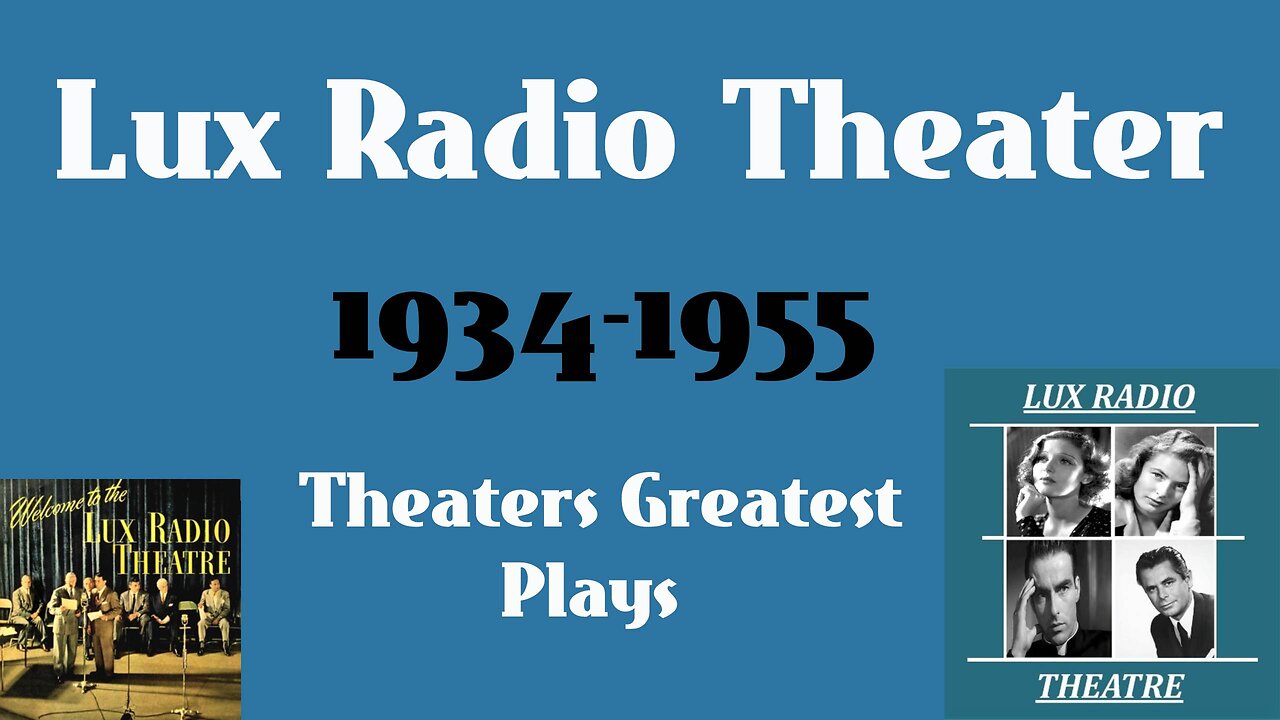Premium Only Content

Lux Radio (1937) Death Takes a Holiday (Fredric March, Florence Eldridge)
Synopsis
After years of questioning why people fear him, Death takes on human form as Prince Sirki (Fredric March) for three days so that he can mingle among mortals and find an answer. He finds a host in Duke Lambert (Guy Standing) after revealing himself and his intentions to the Duke, and he takes up temporary residence in the Duke's villa. However, Death falls in love with the beautiful young Grazia (Evelyn Venable). As he does so, Duke Lambert, the father of Grazia's mortal lover Corrado (Kent Taylor), begs him to give Grazia up and leave her among the living.
Death is torn between seeking his own happiness or sacrificing it so that Grazia may live. After listening to the pleas from the Duke and his houseguests, Death finally decides to let Grazia live and returns to his true self, a black shadow. As he prepares to depart, Grazia chooses to go with him, telling him that she knew all along who he really was. Death then proclaims that love is greater than illusion and is as strong as death. He puts his arm around Grazia, and they both disappear in a flash of light.
Lux Radio Theatre was indisputably the biggest, most important, most expensive drama anthology program on radio. It ran from October 14, 1934 until June 7, 1955, then continued on television as Lux Video Theatre until 1957. In all, some 926 episodes were broadcast, providing a record of the most important entertainment events in American theatre and, later, film.
The show was first broadcast on the NBC Blue Network on Sundays at 2:30 PM. The show featured adaptations of successful Broadway plays when it was produced out of New York, such as Seventh Heaven, the first production starring Miriam Hopkins, Smilin' Through, Berkeley Square, Daddy Long Legs, Peg O' My Heart and Way Down East. On July 29, 1935, the show moved to Monday night at 9:00 PM on CBS, where it would stay until June 29, 1954. The show moved to Hollywood on May 25, 1936 with the production of The Legionnaire and the Lady, based on the film Morocco, starring Marlene Dietrich and Clark Gable.
The audience for this production was estimated as high as 40 million. The show featured many of the most important films of the period, adapted to fit the 60-minute time slot. Some of the titles for 1939 should indicate the caliber and range of shows: Stage Door, Ceiling Zero, So Big, It Happened One Night, The Lives of a Bengal Lancer, Lady for a Day, The Life of Emile Zola, Tovarich, Only Angels Have Wings, The Prisoner of Zenda, The Awful Truth, Wuthering Heights, You Can't Take It With You, The Old Maid and Goodbye, Mr Chips. For its last season, (1954-1955), the show moved to Tuesday nights at 9 on NBC.
Lux Radio Theatre was always broadcast live, with a studio audience and a full orchestra accompanying the performance and providing musical transitions between scenes. As many film actors were used to numerous takes and not live performance, they sometimes suffered acute stage fright before the show. However, since most received $5,000 for their performance -- in addition to free publicity for upcoming pictures -- actors appeared in their original screen roles if they were available. Indeed, production would halt if necessary, on a film if performers were called to appear on Lux. When the actors were not available, others stepped in. The plays were assembled and rehearsed for a week, in sharp contrast to many other shows, which required a minimal of an actor's time. Regular players for the series included Jim and Marian Jordan, otherwise known as Fibber McGee and Molly. Hosts included Cecil B. DeMille (1936-1945), William Keighley (1945-1952) and Irving Cummings (1952-1955). Directors included Tony Stanford, Frank Woodruff, Fred MacKaye and Earl Ebi.
-

Man in America
6 hours agoGold Standard 2.0? The ECONOMIC EARTHQUAKE That Will Change EVERYTHING!
20.5K4 -
 LIVE
LIVE
I_Came_With_Fire_Podcast
5 hours agoTrump Ends Ukraine War? | FEMA Houses Migrants, Forgets Americans! | Treason In The FBI?
521 watching -
 1:07:44
1:07:44
Adam Does Movies
10 hours ago $1.86 earnedHow To Get A Movie Made In This New Era And Is It Worth It? - LIVE!
30.1K1 -
 55:29
55:29
Flyover Conservatives
22 hours agoMEL K | We’re WINNING, But The Globalists REFUSE to Back Down—Here’s What’s Next! | FOC Show
33.2K -
 14:54
14:54
BlackDiamondGunsandGear
9 hours agoIs this BUDGET Optic WORTH your $$$ / Gideon Optics Advocate
22K1 -
 2:25:08
2:25:08
Space Ice
8 hours agoSpace Ice & Redeye: Seagal's Born To Raise Hell & Movie Ideas Feat Alex Lantz
30.9K -
 57:58
57:58
The StoneZONE with Roger Stone
4 hours agoCliff Maloney Defends Elon Musk as Liberal Heads EXPLODE over DOGE | The StoneZONE w/ Roger Stone
46.9K5 -
 1:14:39
1:14:39
Redacted News
7 hours agoBREAKING! Trump's Gaza Ceasefire in Trouble, Peace in Ukraine Imminent | Redacted w Clayton Morris
172K163 -
 7:18:36
7:18:36
Dr Disrespect
11 hours ago🔴LIVE - DR DISRESPECT - THE SHOTTY BOYS - WARZONE CHALLENGE
201K19 -
 57:12
57:12
Candace Show Podcast
7 hours agoJudge Slaps Down Blake Lively. Colleen Hoover Returns. | Candace Ep 146
138K115